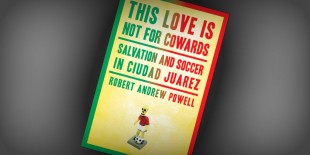On the heels of a tough season, some Union fans may need a source of inspiration, while others may need an escape. This Love is Not for Cowards (Robert Andrew Powell, 2012) provides both, as well as a great gift for the bookworm, soccer fanatic, amateur criminologist, or traveler in your life.
In Not for Cowards, Powell seeks and finds murders, kidnapping, and cheap rent by moving just over the border from El Paso, Texas and following the soccer club in Juarez, Mexico known as Los Indios. The town that he finds is described at the beginning of the book: “Some cities are known for seafood. Some for air pollution. Juarez is easy to forget.” His account of life for the next year develops this theme in surreal fashion.
Juarense live with the terror of an uncontrolled criminal organization and the mindset of daily life, both of which are referred to as La Linea. Powell describes his progress as the sight and stories of freshly slain corpses cause less and less shock. Those families who have lived in Juarez longer are kept silent and hiding from the permanent threat of death. Even when a murderer confessed to his crime, the victim’s mother was killed for seeking justice. Thus, the survivors must forget the truth, their sense of justice, and lost loved ones.
This ever-present threat of death is too heavy to keep at the front of consciousness, and the state-supported gangs are too powerful to challenge, so Juarenses must not “step off the line.” Powell learns that this feeling of numbness defines “full-fledged Juarense.” It might be more accurate than saying it’s easy to forget, to say that it’s necessary to forget.
Into this brutal situation is introduced Francisco Ibarra. Ibarra inherited a relatively successful local construction empire from his father but pursues his true passion for soccer by buying the local club, known as Los Indios. Ibarra paternalistically views his lavish funding of the team as a gift to Juarez, while showing almost religious belief in its destiny to succeed. When these mix, it appears that he believes that he can rescue his city by rescuing their club. While the team’s poor performance in the premier division might compound the city’s dismal living conditions, Ibarra’s financial support, political lobbying, and unwavering optimism in the team’s potential represent a source of hope in a situation that seems entirely hopeless. Powell does not resolve the question, but the reader can’t help but wonder whether this sensation is based predominantly in hope or delusion.
Many soccer fans can relate to these feelings which border on hope and delusion. Not for Cowards provides good coverage behind the scenes at Los Indios and some valuable perspective on the importance of soccer. Even when everything is going wrong, as it occasionally seemed to for the Union this past season, the fans’ hope for the team — the potential of a young squad, the vanquishing of a despised authoritarian, a celebratory leap into the stands, or the return of a crowd favorite — can fan the same flames of hope that a Los Indios goal produces in Juarez. That said, we have also had moments when we realized our self-delusion in expecting certain immature or untalented players to win an MLS Cup.
Juarez has so much to fear and forget, and Philadelphia waited so long for a modern professional soccer team, that each emotion is exacerbated. Basic wins cause ecstasy, and minors hiccups pop the bubble. Whether Powell, you, or I would describe this as rational, Not for Cowards is an interesting and exciting read that reminds us how fortunate we are to live in a place where soccer is one of many sources of hope and delusion that we are able to consciously appreciate.


Comments